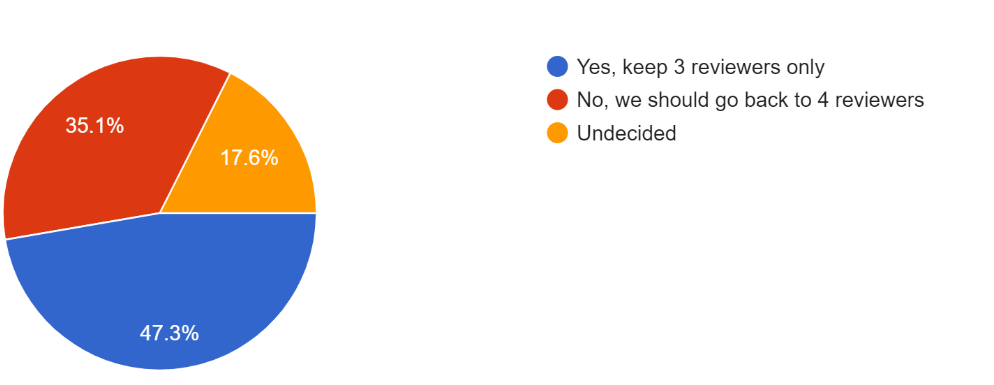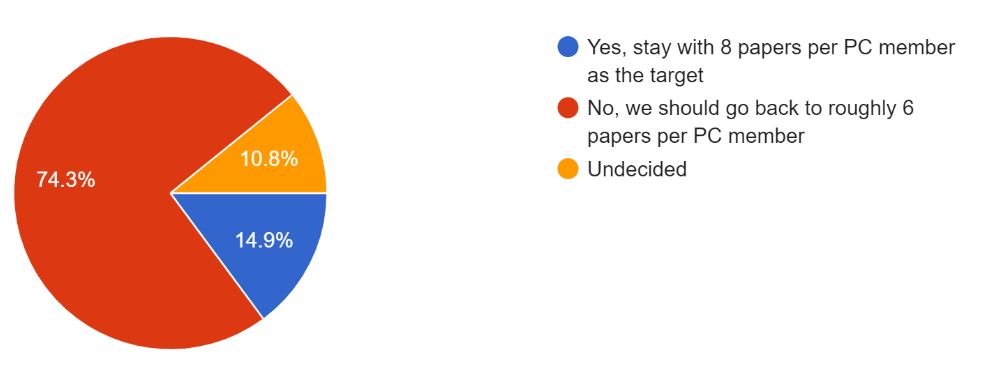The road to VIS 2024 is coming to an end and our work as OPCs is almost done. In a few short weeks, we will be opening the paper program at the conference and we will be saying farewell to outgoing OPC Tamara Munzner, who served the conference both last year as well as this one. Together with stalwart OPC assistant Petra Specht, Holger Theisel and Niklas Elmqvist will continue on for next year, and will be joined by Melanie Tory from Northeastern University as the third OPC.
In other words, this is as good a time as any to reflect on the road to VIS 2024: what went wrong, what went well, and what will happen in the future.
This is the tenth “Road to VIS 2024” post that we are posting to the IEEE VIS website. Overall, we count this blog post series as a positive achievement for VIS 2024. We hope that these posts have helped to shed some light on the inside workings of the conference for both early-career and senior researchers alike. We have valued the chance to speak to the community directly in this way.
If you cast your mind back to the early days of the blog, you may remember our second post on the “Call for Papers”, where we talked about the four changes we were making to the conference for 2024. Earlier this summer, we distributed a survey to our program committee to collect their feedback on these changes and the overall review process this year. Out of a total of 142 PC members and 12 Area Papers Chairs, we received 75 responses—thank you!—which we think is a pretty good rate, and certainly good enough to base our decision-making on.
Our first change, to reduce the number of reviewers per paper from four to three (primary, secondary, and one external reviewer) yielded 47% in favor, 18% undecided, and 35% negative (see below). There were many free-form comments in favor and against; we read them all. Nevertheless, we think that this response warrants continuing the experiment for at least another year. We are awaiting the VSC’s final decision on this proposal for VIS 2025.

Our second change, to increase the load for each PC member from six to eight—and thereby reducing the size of the program committee to free up external reviewers—was much less popular. As can be seen in the pie chart below, 74% were against keeping this load and wanted to go back to 6 per PC member, 11% were undecided, and only 15% felt that the 8 papers per PC member load was acceptable. The comments were rather scathing, with some respondents saying they would decline the PC next year if the higher load was maintained for VIS 2025. While we note that 8 used to be the norm for the VIS conference in the past, we have heard this feedback loud and clear. We are awaiting the VSC’s approval on going back to 6 papers per PC member for VIS 2025.

We also collected general feedback on the review process and read each of the responses. Overall, PC members provided many helpful tips on managing the reviewing load, finding external reviewers, increasing the reviewer pool, improving the transparency of the process, and desk rejecting more liberally. We thank everyone who took the time to offer their thoughts on the process and we will be doing our best to incorporate their feedback, directly or indirectly, for next year.
This brings us to the topic of the future: VIS 2025. While we have not yet even held VIS 2024, it is never too early to prepare for what’s next. Beyond the changes discussed above—keeping three reviewers and going back to six papers per PC member—we have some bold ideas of where VIS should go. Some of these deal with improvements to PCS to reduce the impact of unethical reviewing; see our post on “Decisions”, for more details on this. However, some ideas that we are considering are sufficiently bold or experimental that we would first like to hear what the community has to say about them. For this reason, the VIS 2024 and the incoming 2025 OPCs plan to discuss them at the VIS town hall during the conference. To give you a flavor of some of the things we are considering, we’re thinking about (1) extending the deadline a week for only supplemental material, (2) giving authors the option to publish anonymized reviews with their accepted papers, and (3) introducing a student reviewer program where primary reviewers optionally get to invite a Ph.D. or masters student as an advisory “student reviewer” for each paper they manage.
We hope that you will join us at the VIS 2024 town hall so that you can weigh in on these ideas, and offer any other ideas that you may have for improving VIS in the future.
Anyway, our work here is almost done. This has been quite a ride and we’re looking forward to a vibrant finale at the conference. We can’t wait to let you see the exciting scientific program that the community has assembled. See you in St. Pete Beach!